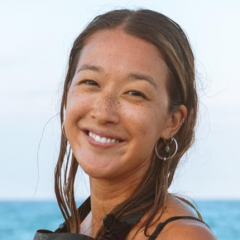Yolanda Waters, March 2023
If you had told me a year ago that I would be heading on an expedition to Antarctica I probably would have laughed. Not only because, I mean, who gets to go to the literal edge of the world? But also, because I think that 20 degrees is cold, and that winter is by far the worst season. Add on top of that, that I would be working together with “Her Deepness” Dr Sylvia Earle? There’s no way.
Fast forward to now and I am preparing for a 10-day expedition to one of the coldest places on Earth with a “simple” mission in mind – develop a set of resolutions to help pace up net zero by 2035. The Antarctic Climate Expedition (ACE) hosted by Ocean Geographic and Dr Sylvia Earle will invite 110 ambassadors from around the world to come together and formulate a unique set of resolutions that highlight: (a) the role of the ocean in mitigating climate change; and (b) the power of individual and community action. The expedition is a floating conference of sorts – the idea being that being immersed in Antarctica, an iconic yet vulnerable place, will inspire fruitful discussions, stronger collaborations, and meaningful outcomes. The resolutions will be developed into action strategies that will be put into motion after the expedition.
How I got involved
So how did I end up here? For context, my background involves finishing my undergraduate honours degree in environmental studies, taking some time off to travel and work in the dive industry, and then returning in 2020 to undertake a PhD. My PhD research attempts to answer questions that I developed during my travels when I realised that opportunities for meaningful climate change communication were being overlooked in marine-tourism settings. I am now deep into the world of environmental psychology and behaviour change.
Having previously worked with Ocean Geographic, I was made aware of the expedition in March 2022 and was asked to sit in on a steering committee meeting to learn whether there might be a role for me. The idea of the expedition was difficult to get my head around at first, but once I realised the potential it could have (a trip dedicated to developing a list of key actions and behaviours for effective ocean-climate action??) and the relevancy of my work, I started to share my thoughts with the team. To be honest, it surprised me how much I had to say, and I was worried I had said the wrong things (e.g., questioning their entire approach). But before I knew it – I was asked to lead an expert elicitation process to help develop the resolutions.
The process so far has been chaotic but eye-opening. For example, this is the first time I have experienced the trials and tribulations of large group emails, organising meetings for several different time zones (in other words, very late nights for me), moderating conversations between scientists and cinematographers, trying to keep large group conversations on topic, and so on. Being constantly surrounded by incredible social scientists during my PhD, it is also the first time I feel like I have really had to justify my every step. It turns out that not everyone recognises the value of social science methods in conservation. That, and that everyone seems to hate a survey.
Stepping outside the university context and into the “real world” has also taught me the reality of what it is to be young and female in a landscape riddled with agendas, egos and politics. Even though anyone who pays attention knows that this is by and large how the world works, it is another thing to see it up close and personal. To have your legitimacy questioned, to try and stand your ground in front of biophysical scientists, policymakers, political leaders and renowned storytellers and suggest that maybe they don’t understand – it has been a steep learning curve to say the least.
Combine this with the never-ending battle with imposter syndrome (which I’m sure most PhD students are familiar with?) and it makes for a terrifying yet valuable lesson in applied research. Though I have to say that I am proud of the work I have done so far and look forward to continuing the process once we board the ship.
Final pre-departure thoughts
Naturally the trip invites criticism – a floating conference only accessible to those who could afford to participate and those willing and able to travel from around the world. As we get closer to the departure date, I find myself reflecting on this, particularly considering recent global climate and ocean conferences. Will we be able to a make a meaningful contribution? Regardless, I am inspired and determined to make the most of this trip. There is no doubt that it will be a once-in-a-lifetime experience and milestone moment in my career. I am grateful for all the support I have received so far and look forward to reporting back in a few weeks’ time!
You can find more details about the trip here: https://elysiumepic.underwaterartists.com/project-brief or follow my journey on Instagram (@yolandaleewaters) or Twitter (@yolowaters).
Thanks to Ocean Geographic, CBCS and my generous GoFundMe donors for making this trip possible!
Teaser image: Portrait of Yolanda
Image above: Penguin ballet, Antarctica. Photo: Ocean Geographic

